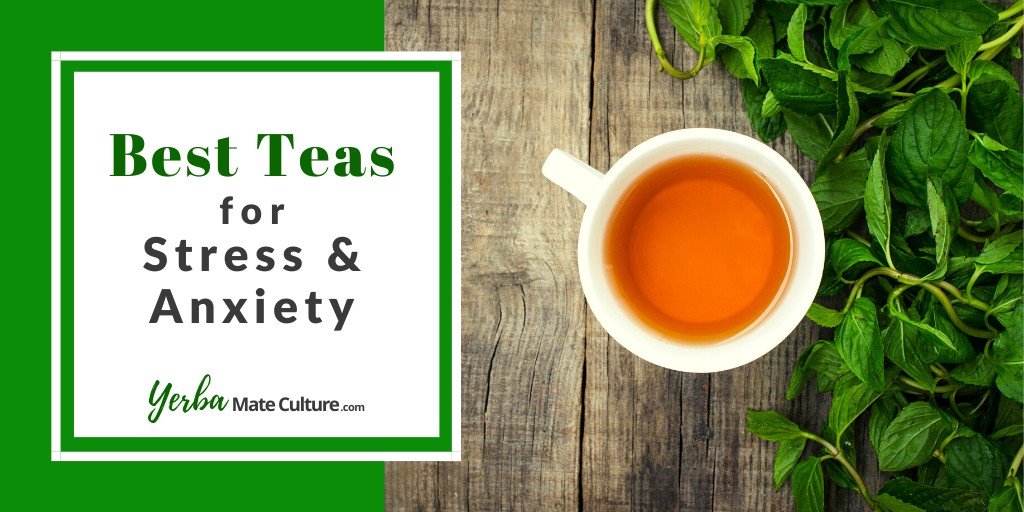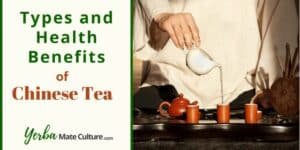Our world presents many circumstances that can trigger unpleasant and tense feelings. Often you may be nervous about the possibility of an unpleasant outcome to a situation or life event that you are going through. Common examples include moving to a new city, a job interview, or an important exam.
Read this guide to find out what are the best herbal teas for stress and anxiety, and to understand what is causing these feelings in the first place.
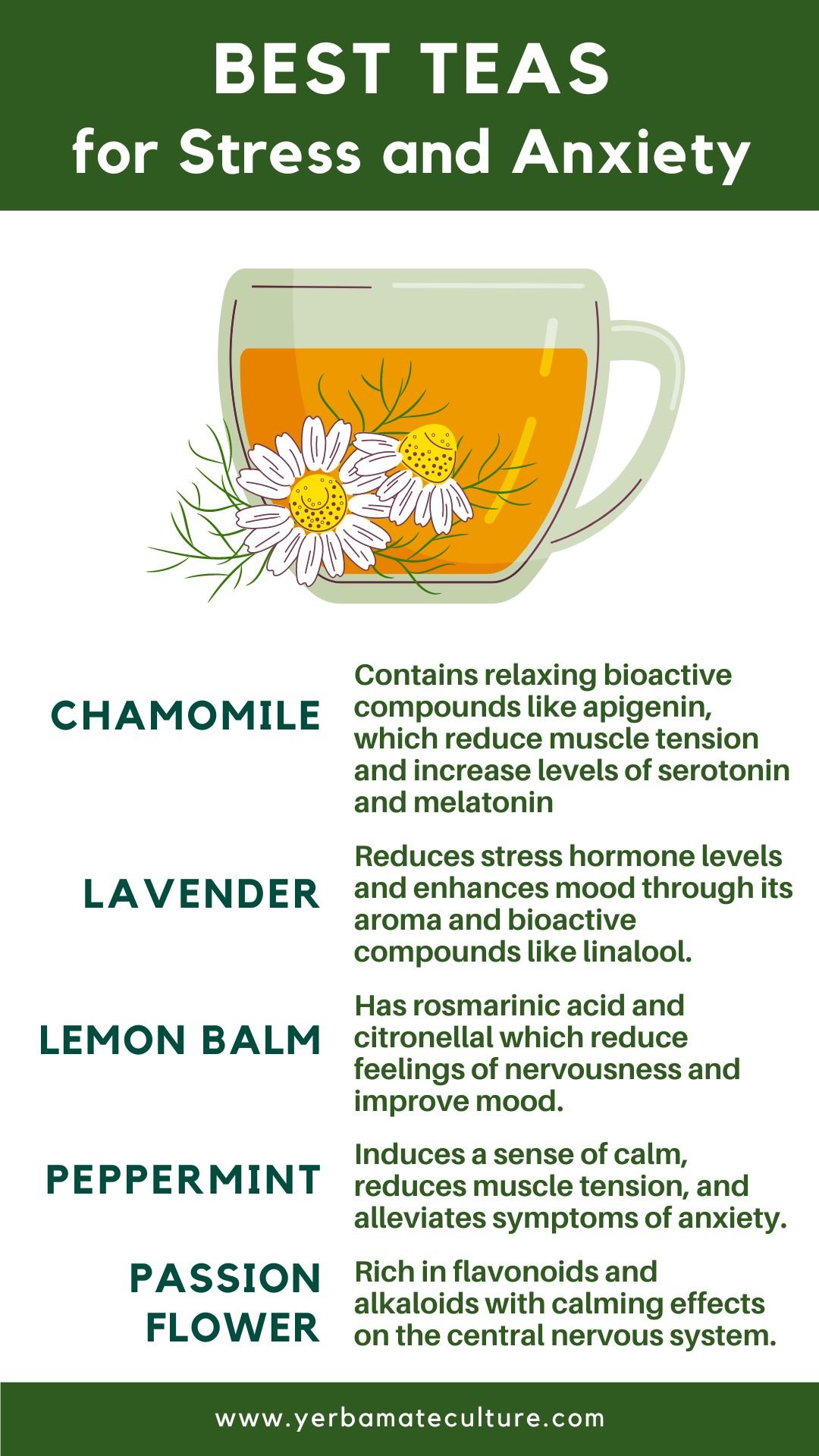
Science Behind Stress and Anxiety
To appreciate what these wonderful herbal teas can do for you, it’s helpful to understand a few things about the science behind stress and anxiety.
Even though stress and anxiety can be experienced at the same time, they are different.

We live in a busy world with constant stimulus and challenging situations that cause these feelings. Everyone is affected by stress at one time or another.
A stressor (or stress) could happen only once or it may happen over a short time period. It can also occur repeatedly, or even over a long-term time frame.
What Happens in Our Brain When We Experience Anxiety?
The journal Nature Communications published a study that provides insight into this question. The study was conducted on 2 rhesus monkeys trained for the study. These monkeys have brain structures that are akin to those of people.
The research revealed that cells located in specific areas in the brain are activated when anxiety is present.
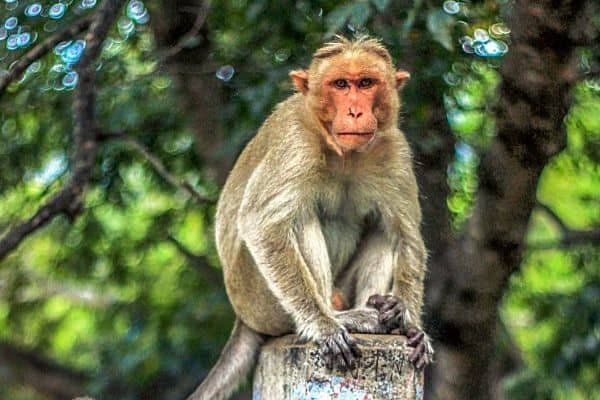
Three different geometric patterns were used to train the monkeys. One pattern was linked to having an annoying puff of air blown in their face when they saw that shape. Another pattern came with a 50 percent chance of getting that puff of air blown in their face an uncertain outcome. The last and third pattern had no outcome associated with it.
While showing the three different geometric patterns to the monkeys, the neuronal activity in the monkeys’ brains was monitored.
The interesting part?
Brain cells in the anterior cingulate cortex (ACC) of the monkeys were activated when they saw the pattern that was related to the uncertainty – the 50-50 chance of the air to be puffed into their faces.
The researcher who organized this study concludes: “A population of neurons (in the brain) activated specifically when monkeys thought something bad or annoying – like a puff of air to the face – might be coming, but not when they knew for certain it was.”
Likewise, the insights and results of this study can be applied to understanding how anxiety can affect the brains of people.
Being uncertain about something is a common trigger for anxiousness.
What Causes Stress?
Stress is not always a bad thing. There are many times when stress is to your advantage.
For example, when a dangerous scenario presents itself. This, in turn, triggers stress signals in your body: Your muscles tense up; your breathing becomes faster; and you become more focused.
This actually prepares you for “fight or flight.” It is a survival response mechanism that is beneficial.
Some stressors occur naturally on any given day, including:
- Pressures of maintaining daily responsibilities
- Driving in traffic
- Keeping time schedules
- School or work
Day-to-day stress may lead to unwinding with a glass of wine, missing out on a meal, or staying up too late and getting shortchanged on a good night’s rest.
These types of negative stressors can add up. When this happens, stress can initiate – or even heighten – an anxiety response, too.
Long-Term Stress is a Problem
Mid- or long-term stress, can be detrimental to your health.
There are specific levels of stress that are coined as “chronic stress” or “acute stress.” In essence, with multiple stressors accumulating over a longer period of time, the body does not get the “all clear” signal it needs to go back to its normal functioning levels.

Rick Hanson, Ph.D., a neuropsychologist and author says it this way:
The problem is that “modern life exposes us to mild-to-moderate, but chronic stress constantly – multitasking, juggling too many things, moving too quickly, being bombarded with stimulation.”
That is, people are not designed to “flee” from predators for a continuous 10 hours a day without breaks. But that is essentially the way the body (and brain) are interpreting it.
“Your body can’t differentiate between a saber-toothed tiger attack and a bad job review.” – Henry Emmons, MD, Perry George Institute for Health and Healing
Over time, stressors can build up, putting the body under negative pressure.
What Causes Anxiety?
Like stress, anxiety is a natural part of life. The usual triggers range from an incident to an emotion, or an experience. Some of the causes may surprise you.
Common triggers for anxiety:
- Everyday Situations: Important decision, a problem at work, or taking an exam.
- Financial Problems: Worrying about an unexpected bill or experiencing an interruption in income are a couple of examples.
- Chronic Health Diagnosis: Receiving this kind of information can burden your sense of well-being and trigger anxiety.
- Medication: Certain prescription or over-the-counter (OTC) medicines can cause anxiety symptoms (e.g. asthma or allergy medicine). The active ingredient may cause a feeling of uneasiness that later builds into anxiety.
- Caffeine: For some people, caffeine can induce anxiety. Remember this when you reach for that morning cup of coffee to wake up.
- Skipping Meals: Eating irregularly may have a negative effect on body function. For example, skipping a meal can trigger a drop in blood sugar which affects feelings of distress or anxiety.
Anxiety Disorders
Anxiety is usually expressed as a temporary worry or fear but there are times, however, when the feeling does not pass. It can become worse and even interfere with regular daily activities, such as working or relationships.
When prolonged, it can develop into an anxiety disorder, such as generalized anxiety disorder (GAD), panic disorder, or phobia-related disorders.
The Washington Post reports that new Census Bureau findings tell that 34 out of every 100 adult Americans show signs of clinical anxiety, depression, or both.
Daily stresses that occur uninterrupted over a longer period of time clearly combine for a negative impact on your body that can result in anxiety. Conflict of ongoing arguments, relationship problems, even court battles are examples of stress that can grow over time into a chronic stressful situation.
The result can be an anxiety disorder.
With an appreciation for the pressure and worries that can occur in everyday life, let’s take a look at the best herbal teas to help relieve stress and anxiety.
Best Herbal Teas for Stress and Anxiety
Luckily, there are some effective home remedies that can aid with the daily stress of life and help you relax.
Here are 5 of the best herbal infusions that offer relief and enjoyment. This list is based on scientific studies as well as my own experience.
1. Chamomile Tea
This mild tea has a delicate flavor. It is made from daisy-like plants in the Asteraceae family.
Chamomile is one of the most commonly used herbal therapies on the planet. Its most popular use is as a calming tea and it’s often used as a natural therapy for general anxiety.

Chamomile tea contains bioactive compounds like apigenin, which act on the central nervous system. This herbal tea has a relaxing effect and it can help reduce muscle tension and increase levels of serotonin and melatonin.
As reported in the Alternative Therapies in Health and Medicine and Pharmacognosy Review, research shows it’s one of the best teas for promoting rest and fighting stress.
You can find the best chamomile tea brands in this guide.
2. Lavender Tea
Lavender tea has many proven health benefits and it is often used to promote better sleep. It also helps with panic attacks, irritability, and nervous stomach.
Lavender’s properties to alleviate anxiety are well studied. It helps with stress and anxiety by promoting relaxation, reducing levels of the stress hormone cortisol, and enhancing mood through its aroma and bioactive compounds like linalool, which have calming effects on the nervous system.
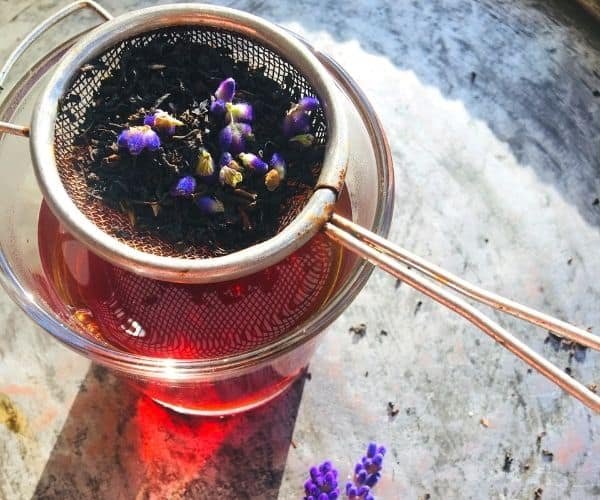
In one double-blind study, lavender capsules were given to subjects who experienced significant anxiety levels that were induced by watching stress-provoking film clips. The other group was given a placebo. The study found that lavender reduced anxiety levels.
More research reveals that lavender lowers anxiety in patients who were undergoing bypass surgery for coronary artery, and in people who were visiting the dentist.
Further, in five more clinical studies published in The Mental Health Clinician, lavender was found to be effective in reducing anxiety.
You can make this wonderful relaxing herbal tea with 4 teaspoons of fresh flower buds from the lavender plant. Pour hot water over it, and steep the tea for 10 minutes.
Relax and enjoy its delightful aroma, along with its many properties known to relax the nervous system.
If you are looking for a convenient option, you can find my favorite lavender teas in this guide.
3. Lemon Balm Tea
Lemon balm tea has many health benefits. It is an herbal remedy often used for alleviating the symptoms of anxiety and insomnia.
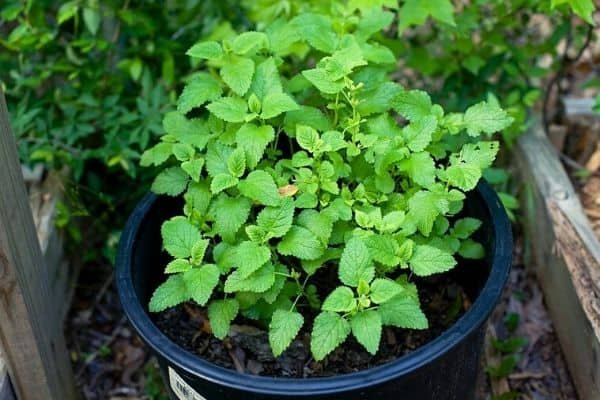
Clinical research on lemon balm has shown improvements in both mood and cognitive performance. So, sip away and enjoy this refreshing herbal tea to de-stress and ease into peaceful rest.
Steep 1 tablespoon of lemon balm leaves in a cup of hot water. Drink it before you go to sleep for a restful night. Or simply enjoy this lemon-scented herb any time of the day or night to eliminate that pesky tension or unwanted blues.
4. Peppermint Tea
Peppermint has a wide array of health benefits. It can be used to soothe an upset tummy, ease upper respiratory infection, or treat a sore throat.

Drinking peppermint tea is also helpful in stress relief. Just smelling its refreshing aroma may help with improving mood and reducing anxiety and fatigue.
Peppermint tea helps with stress and anxiety by inducing a sense of calm, reducing muscle tension, and alleviating symptoms of anxiety. These effects are mostly attributed to the presence of menthol, which acts as a natural muscle relaxant and anxiolytic.
Has it been a stressful day that has left you with a tension headache?
Try steeping a tea from peppermint leaves and combine it with your favorite chocolate. Mix in almond milk and you have a delicious remedy. And why not use some peppermint oil as well.
One clinical study has shown that applying peppermint oil to the forehead and temple area resulted in reducing the intensity of a headache in as little as 15 minutes. The study showed the peppermint was as effective as 1000 mg of acetaminophen.
You can grow your own perppermint, buy it from the grocery, or check out this guide with my favorite mint teas and order it online.
5. Passion Flower Tea
The flowers, stems, and leaves of Passiflora can be used to prepare a calming herbal tea.
Passionflower tea helps with stress and anxiety by promoting relaxation, reducing nervousness, and improving sleep quality. It contains flavonoids and alkaloids, which interact with neurotransmitters in the brain to produce calming effects on the central nervous system.
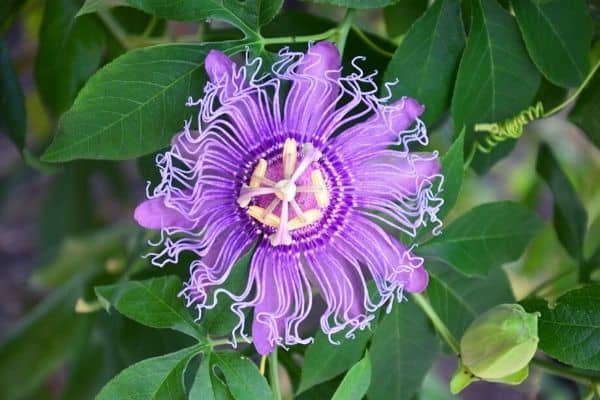
A double-blind randomized controlled trial indicates that when it comes to treating generalized anxiety disorder this plant is as effective as oxazepam, without the side effects. Oxazepam is a prescription medicine used to treat anxiety and acute alcohol withdrawal.
A relaxing cup of passion flower tea is only 6 minutes away. Steep 1 to 2 teaspoons of the dried buds in hot water and enjoy.
How to Relieve Your Stress and Anxiety Naturally
The benefits of drinking these herbal teas are proven to be effective to help combat stress and anxiety disorders.
There are other things that can help, too.
Here are my best tips for relieving stress and anxiety:
Healthy Lifestyle: Regular sleep and exercise are important for mental balance and well being.
Socializing: Talking and connecting with friends and family is a good way to unwind and get things off your mind.
Avoid Multitasking: Try to focus on being in the present moment and doing one thing at a time. Trying to juggle too many things simultaneously is straining.
Less Caffeine and Alcohol: As much as possible, avoid excessive consumption of these substances. Both are linked to anxiety disorders and consuming alcohol has risks that can outweigh the perceived benefits for relaxation.
Cold Therapy: I have found that a cold shower or swimming in cold water has a calming and relaxing effect. It helps your mind focus on the present moment and may also decrease cortisol, a stress-inducing hormone.
Herbal Teas: Regularly drink the herbal teas introduced in this article. You can also make your own blend by combining some of them in one drink.
If you have any questions or comments, please post them below.
Enjoy your tea and relax!

About the author:
Patrick Bailey is a professional writer mainly in the fields of mental health, addiction, and living in recovery. He attempts to stay on top of the latest news in the addiction and mental health world and enjoys writing about these topics to break the stigma associated with them.

